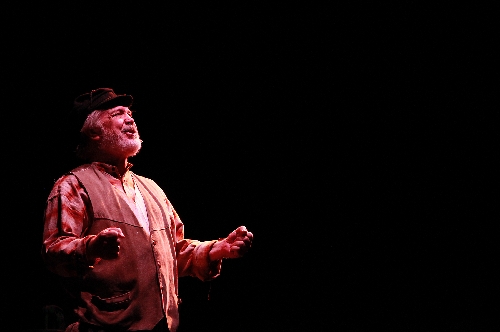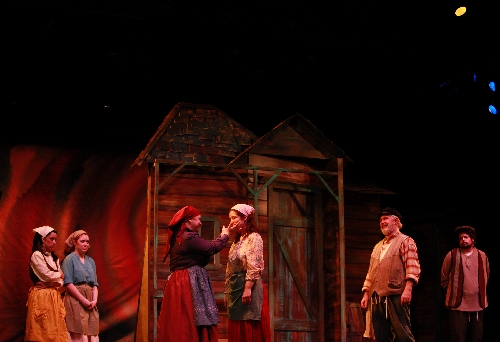Themes endure as ‘Fiddler on the Roof’ opens at Spring Mountain Ranch


"… And if our good fortune never comes, here’s to whatever comes, drink, l’chaim, to life!"
— "Fiddler on the Roof"
Sunrise — they’re not kidding — Sunset.
"Swiftly fly the years," the song tells us. "One season following another. Laden with happiness and tears." Barrels by like a runaway train, doesn’t it?
Just a scant 46 years ago, an 8-year-old boy watched "Fiddler on the Roof," his first Broadway show, in 1965. (Growing up in New York, seeing "Fiddler" was a Jewish rite of passage bested only by bar mitzvahs, circumcisions and a good schnapps.)
Amazed and slack-jawed was the reaction, not only over the gorgeous fantasy world that sprang from a Broadway stage, but the exuberant revelation of one’s heritage in ways rote synagogue services and dry Hebrew school lessons never achieved.
Tevye the Milkman was Everything Jewish, right down to his cozy chats with God and his jiggly "biddy-biddy-bum." (Tevye was then Herschel Bernardi, who replaced 1964’s original star, Zero Mostel.)
However, nearly a half-century later, long into Jewish adulthood, an ex-8-year-old wonders: What does "Fiddler on the Roof" really mean? Is it more symbolic than realistic?
Consider that if you attend Jade Productions’ "Fiddler" at Spring Mountain Ranch State Park. There, they’ll re-create the little mythical village of Anatevka in 1905 czarist Russia, where Tevye copes with his three strong-willed eldest daughters, the unmooring of cultural and religious traditions to which he desperately clings, and the pogroms perpetrated by the Cossacks — as the rooftop Fiddler symbolizes keeping one’s balance amid the triumphs and travails of life.
(Classic tunes include "If I Were a Rich Man," "Matchmaker," "Tradition," "Miracle of Miracles," "To Life!" and "Sunrise, Sunset.")
Beyond a reminder of ethnic cleansing horrors with current corollaries in Darfur and Kyrgyzstan — plus the eternal rebellion of youth against parents — "Fiddler" famously speaks to coping with a changing world and values. That lends it an ageless, recurring power as today’s world spins ever faster, traditions having no time to take hold, seeming archaic.
Though over the head of an 8-year-old at the time, "Fiddler" surely resonated with 1965 audiences as the values of America — two years past the JFK assassination, two years away from the Summer of Love — were getting monumentally scrambled. On a lighter level, "Fiddler" can correspond to our techno-world as Tevye-like Luddites cling to land-line relics in an iPhone age. "Fiddler" even winked at shifting social attitudes when one revival starred Harvey Fierstein and Rosie O’Donnell — both openly gay — as Tevye and his wife, Golde.
Those of us who are second-generation Americans of the baby boom age relate to the escape of Tevye’s family to America in our relationship to our grandparents who arrived here from Eastern Europe and elsewhere in the early 20th century. (For this writer, whose grandparents came from Austria, the struggle over traditions was evident in the language of their Bronx home, where the wife preferred English, while her husband insisted on Yiddish.)
"Fiddler" also is a refresher course on religious practices — and a source of guilt for some contemporary Jews identifying themselves as "culturally Jewish." Yes, we grew up attending weekly services, honoring the high holidays and lighting the Sabbath candles. (Few Broadway tunes are as catch-in-the-throat beautiful as "Sabbath Prayer" in "Fiddler.")
Now? Not so much. "Fiddler" reminds many of us that we’ve allowed our Judaism to become a matter of choice, rather than one of unshakable identity.
Yet some "Fiddler" elements are contestable among Jews. Dancing with the cruel Cossacks in "To Life!"? Some would equate that with Jews in 1940s Germany kicking up their heels with Nazi stormtroopers. Stark poverty in "Fiddler’s" shtetl life has a bit too much shine, not enough grime, looking more like what we’d now call lower middle class.
Most debatable is the fate of the daughters, each defying their tradition-bound papa by rejecting their father’s and the matchmaker’s matches.
Eldest daughter Tzeitel, unhappy with her father promising her to old butcher Lazar Wolf, opts for young tailor Motel (pronounced "Mottle"), marrying (gasp!) for love. Daughter Hodel also rebels, choosing Perchik — a socialist who loudly challenges traditions — leaving Tevye further flummoxed.
Most painfully, younger daughter Chava falls in love with the Russian Fyedka — a non-Jew — a sin Tevye cannot forgive. Or can he? Should he?
Reading Sholom Aleichem’s stories on which "Fiddler" is based, it is clearly abhorred, and the act splits the family as the young couple do not join them in the forced exodus. Whether "Fiddler" condemns or condones intermarriage is open to interpretation. As yet another act of defiance and independence among Tevye’s daughters, it could be construed as one more progressive step. Some view the deeply hurt and angry Tevye’s parting words to them — "Peace be with you" — as a tacit rapprochement, a flicker of reconciliation and acceptance to come.
A century after "Fiddler" is set, intermarriage remains a tricky issue for Jews, some of whom are casual on the subject when younger, then are moved to rededicate themselves to Judaism once they contemplate having families.
That’s where "Fiddler" cuts to the bone: Despite the pain Tevye endures outside and within his own family, he remains devoted to God.
Does that validate the power of prayer or expose the futility of faith?
Questions, questions — appropriate for a people who often joke that they answer questions with more questions.
Analysis aside, accept advice from an eternal 8-year-old: revisit a musical celebrating the joy — and "oy" — of life.
Hoist a schnapps … L’chaim.
Contact reporter Steve Bornfeld at sbornfeld@reviewjournal.com or 702-383-0256.
PreviewWhat: "Fiddler on the Roof"
When: 8 p.m. today-Saturday, Wednesday, Aug. 18-20, 24-27
Where: Spring Mountain Ranch State Park, 18 miles west of town off Charleston Boulevard
Cost: $12 in advance, $15 at the gate (594-7529)
unlvtickets.com
supersummertheatre.org












